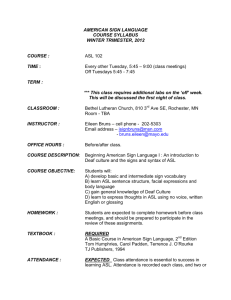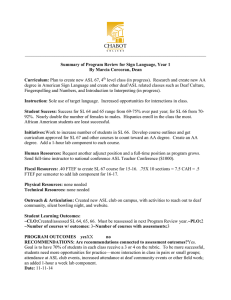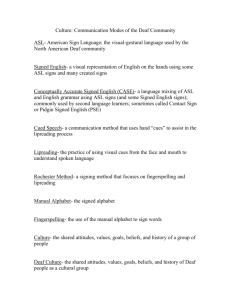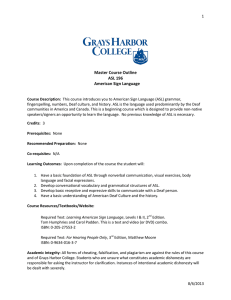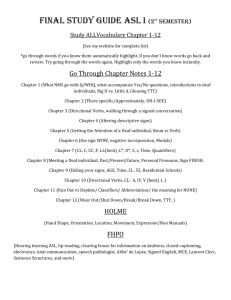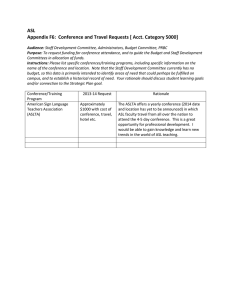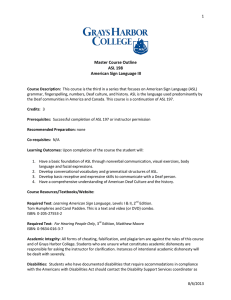ASL 202 Syllabus - Onondaga Community College
advertisement
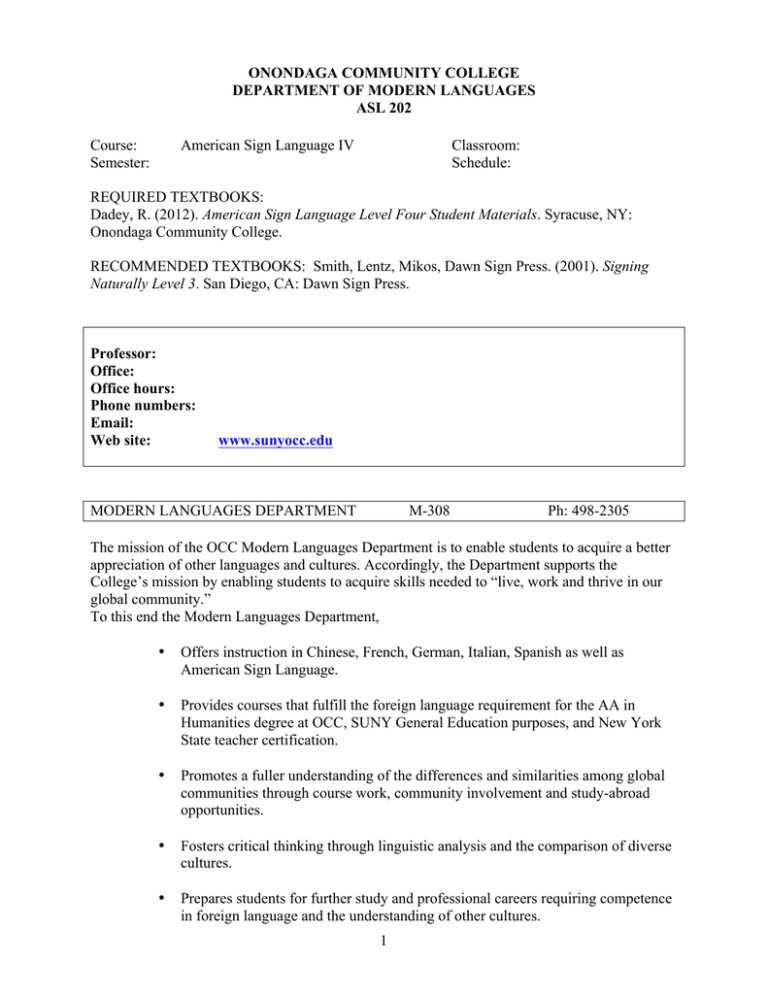
ONONDAGA COMMUNITY COLLEGE DEPARTMENT OF MODERN LANGUAGES ASL 202 Course: Semester: American Sign Language IV Classroom: Schedule: REQUIRED TEXTBOOKS: Dadey, R. (2012). American Sign Language Level Four Student Materials. Syracuse, NY: Onondaga Community College. RECOMMENDED TEXTBOOKS: Smith, Lentz, Mikos, Dawn Sign Press. (2001). Signing Naturally Level 3. San Diego, CA: Dawn Sign Press. Professor: Office: Office hours: Phone numbers: Email: Web site: www.sunyocc.edu MODERN LANGUAGES DEPARTMENT M-308 Ph: 498-2305 The mission of the OCC Modern Languages Department is to enable students to acquire a better appreciation of other languages and cultures. Accordingly, the Department supports the College’s mission by enabling students to acquire skills needed to “live, work and thrive in our global community.” To this end the Modern Languages Department, • Offers instruction in Chinese, French, German, Italian, Spanish as well as American Sign Language. • Provides courses that fulfill the foreign language requirement for the AA in Humanities degree at OCC, SUNY General Education purposes, and New York State teacher certification. • Promotes a fuller understanding of the differences and similarities among global communities through course work, community involvement and study-abroad opportunities. • Fosters critical thinking through linguistic analysis and the comparison of diverse cultures. • Prepares students for further study and professional careers requiring competence in foreign language and the understanding of other cultures. 1 SYLLABUS ASL 202 – AMERICAN SIGN LANGUAGE IV COURSE DESCRIPTION AND PLACEMENT: This course is a sequel to American Sign Language III. It expands upon complex grammatical and lexical structures. It is conducted entirely in American Sign Language and provides a solid foundation for advanced study. Upon completion of ASL 202, students may enroll in any intermediate-high level course. Students who successfully complete the 202 level have fulfilled their language requirement for the A.A. in Humanities and Teacher Prep programs. The three additional credits may be taken either as a language course or as a general elective. This course also fulfills the Global Awareness requirement at Onondaga. Prerequisite: ASL 201, or five years of high school ASL, or Permission of Instructor. LEARNING OBJECTIVES: At the end of a semester of study, students will be able to perform as indicated in each of the following areas: 1. Demonstrate increased comprehension and expression skills at an intermediate level within a conversational format when describing and identifying people, places, locations, objects, and describing accidents. 2. Demonstrate increased knowledge of ASL culturally appropriate conversational communication behaviors to enhance conversations. 3. Create and produce short narratives at an intermediate level while continuously enhancing their use of ASL Discourse structures. 4. Demonstrate in writing and through classroom interaction and presentations an increased knowledge of the linguistic structure of ASL, conceptually accurate signing, idiomatic forms, fingerspelling, numbers and other grammatical features in ASL. 5. State and justify ideas/thoughts/opinions discussions on various controversial issues in Deaf culture and the Deaf community. 6. Compare cultural, linguistic, political and social issues of ASL and Deaf people with students’ own language, culture and community. METHODOLOGY Through the integration of different skills of receptive (reading signs) and expressive (signing ones own thoughts) as well as the introduction of important cultural concepts, students will learn to communicate in the target language in progressively more involved daily life situations. 2 EVALUATION AND GRADING We will cover units 19-23 in this course. Your final grade will be based on the following: Participation (includes daily use of target language) Homework Assignments Formal Evaluations Final Exam (comprehensive) 20% 20% 40% 20% SCALE: 94 -100 A 90 - 93 A87 - 89 B+ 84 - 86 B 80 - 83 B77 - 79 C+ 74 - 76 C 70 - 73 C64 - 69 D Below 64 F ATTENDANCE AND PARTICIPATION (20 %) Attendance in this course is required and, therefore, inconsistent attendance will negatively impact your participation grade. Note that although class attendance is important, it is not the same as class participation. Your daily class participation grade will be based on the students’ daily level of preparedness, engagement in the learning process, participation, spontaneous volunteering, use and quality of the target language, and respect for others and for the culture being learned. HOMEWORK ASSIGNMENTS (20 %) Six group labs, four individual expressive and written labs, three required community event reports, several written responses to reading assignments, and other homework assignments are due on assigned dates as outlined in the syllabus and on class PowerPoints. FORMAL EVALUATIONS (40%) Quizzes and exams (including expressive exams) will be given. The ML Department’s policy states that no make-up quizzes or exams will be allowed. However, your lowest quiz grade will be dropped. In the event of a documented emergency the day of an exam, your professor will decide whether the justification is appropriate and allow you to take a make-up exam at the end of the semester, provided your attendance is outstanding and you have not missed any other quizzes or exams. FINAL EXAM (20 %) The final exam will consist of an individual expressive presentation on an assigned topic, expressive sentences, and a written essay. ACADEMIC RULES – STUDENT RIGHTS AND RESPONSIBILITIES AT OCC - Rules: Visit Http://students.sunyocc.edu/academics or find them in your Student Handbook - Code of Student Rights and Responsibilities: See Student Handbook - Academic Integrity: See Student Handbook 3 SUCCESS IN LANGUAGE LEARNING Your success in this class depends on your effort to: • Take a class that better matches your level of proficiency in the language. • Be in class all of the time and for the entire class time. • Take full responsibility over your learning experience. • Actively, independently and enthusiastically engage in the learning process. • Make positive and enriching contributions to the class. • Be organized and pay attention to detail. • Consistently do assigned homework and study: Practice the four skills: listening, reading, writing and speaking. • Drill yourself. Turn in homework on time. • Perform well on tests and other assessment tools. • Participate in cooperative learning opportunities. • Celebrate every small progress you make (don’t be hard on yourself). • Be respectful of the language and cultures being learned. • Be respectful of all classmates and of your instructor. • Get help in a timely manner form any of the Resources below. LANGUAGE RESOURCES • • • • • • • • • • Your Textbook: Use it to review material. Your Professor: Stop by his/her office during office hours, or make an appointment. Peer Study Groups: Start your own or ask your instructor for assistance. ANGEL: Learning Management Suite of tools. Computer Lab: Academic Computing Center, Helpdesk, Internet Cafes. Coulter Library: Course materials are on reserve in the Media counter. Books, movies and other are also available at the Library. Content Tutoring Center: You do not need a referral and the service is free of charge. Disabilities Services Office: If you require special accommodations for this class, visit the DSO in Gordon Student. In addition, please see your professor to discuss your individual circumstance concerning this course. Study Skills Center: Learning Strategies Assistance. Writing Skills Center: Daytime, night-time and online tutoring. 4 AMERICAN SIGN LANGUAGE IV COURSE GUIDELINES AND REMINDERS E-MAIL: I will send E-mail messages/reminders to the entire class occasionally. If you do not read your OCC mail, make sure you ask that the messages be forwarded to your preferred address by calling 4982997 or go to Coulter Room 214. ANGEL: I store much of the course information, power point presentations, hand-outs, homework assignments, grades and other course information on ANGEL under our course number. It is imperative that you visit our ANGEL page daily as any homework updates or important reminders will be posted there as well. INSTRUCTIONAL METHOD: The entire class will be conducted in ASL only. No voicing will be used except for specific times put aside by your instructor. During this total immersion language experience you need to pay careful attention to what is being communicated by both instructor and classmates. Do not panic if you do not understand everything immediately. Try to understand the meaning through context. Everything is contextualized, with instruction based on previously learned material. There will also be a great deal of repetition to practice your ASL skills and course material is presented through a variety of techniques and activities to make learning interesting and fun. EXTENDED RESPONSIBILITIES: Learning ASL is similar to learning other languages. You should expect it to be challenging and to require a lot of practice, memorization, critical thinking and developing skills in real communication situations. You will need to practice outside of class to be successful, and it is best to practice with others. You will be required to form small practice groups and meet for a minimum of 1 hour every two weeks with your group. (See ASL lab requirement sheet and documented lab report sheets) COURSE MANAGEMENT: 1. Attendance in every class period is mandatory. As mentioned in the syllabus, inconsistent attendance will negatively impact your grade and result in a lowered letter grade. The participation grade will be based on students’ daily level of preparedness, engagement, spontaneous volunteering, use and quality of the target language and respect for others and for the culture being learned. (See participation rubric for more detailed expectations). Your daily participation grade will be based on a 5 point system and graded as follows. • on time, fully engaged and participating – 5 points • late or leave early, but fully engaged and participating – 4 points • partially engaged and participating – 3 points • late or leave early and partially engaged and participating - 2 points • not engaged, participating, or absent – 0 points 2. If you miss class, it is your responsibility to get information from ANGEL and your lab group. You need to be prepared for each class. 3. If you know you will be late for a class or are sick, call or email your instructor before class starts. 4. Late homework/project assignments will not be accepted. Each assignment will be graded and determined by level and quality of performance. 5. There will be no makeup quizzes or exams. In the event of a documented emergency the day of an exam, your professor may decide whether the justification is appropriate and allow you to take a make-up exam at the end of the semester providing your attendance is outstanding and you have not missed any other quizzes or exams. 5 ADDITIONAL COURSE ACTIVITIES & GUIDELINES: In ASL IV, students are expected to perform different out of class assignments to fulfill the requirement of this course. These assignments are: 1) Four individual labs (Formal Evaluations) 2) Three Deaf Events 3) Reading assignments 4) Six group labs 1. Individual Labs: Textbook/video Assignments; Expressive Practice Sentences; & Written English translation of an ASL story Each unit in the Signing Naturally textbook consists of language, culture and grammar practice. In addition, students will be assigned to sign expressive practice sentences using semantics for each unit. Students will be tested on these sentences which will be included in the expressive tests for each unit. Also, students will be expected to express a 2-minute story to describe a picture or video clip. Las, but not least, students will have to view an ASL story and write a translation using proper written English (not a glossed summary). 2. Deaf Events Students are required to attend three different Deaf Community Events. The Deaf Community Events may be found online at: http://deafcoffeecny.ning.com/ or http://cnydeafadvocacy.wikispaces.com/, ANGEL and flyers provided by your instructor. Deaf events may include attending a social event such as Panera Bread, Deaf Bowling, Deaf Club, Interpreted Church Service, Interpreted Performance, and so on. After attending an event, you are required to type up a two page reaction of your experience describing your opinions, feelings, and insights. Include: 1. Name of the Deaf Community Event. 2. When the Event occurred. 3. What was the purpose of this event? 4. Describe the people who attended. 5. What did you observe? 6. How did it make you feel? 7. How did the Deaf make you feel? 8. What thoughts and feeling did you have toward this event? (before and after) 9. What did you learn from this experience? 10. Compare the difference between a hearing event and a Deaf event. 3. Reading assignments Students will be assigned three articles to read throughout the semester. These readings are required, and students will reflect on each article by writing a two-page response. Each response should include the following information: a. A brief summary of the main points (1/2 page). b. What you learned and your reaction – share your thoughts, feelings, and insights (1 pg) c. How you can apply what you learned to your study of ASL and involvement in the Deaf community (1/2 page) 6 4. Group Labs Students are required to meet with their lab groups six times outside of class throughout the semester. These sessions should be no shorter than one hour in duration for each lab assignment. Students may meet on campus but are not required to do so. The purpose of the lab meetings is to: a. Increase students’ opportunities to interact with others in sign language. b. Provide an opportunity for additional reinforcement of new principals and vocabulary. c. Provide a safe place for students to use sign language at a level in which they are comfortable. d. Build relationships outside the classroom. Students will use lab assignment sheets to indicate who attended their lab group meetings, what their lab group meeting accomplished and any questions or concerns that may have arisen. Each student must fill out his/her own lab sheet and turn it in on the designated due date as outlined on the syllabus. The lab sheets are one way the instructor can become aware of individual needs. Each lab sheet should include the following information: a. Name/s of other group members attending: b. Lab activities and conversations c. Specific questions about signs, grammar, culture, class, etc. d. Personal impressions of your signing abilities, skill improvement and accomplishments. e. Questions, concerns or comments that you may have about this lab or class. • If you are unable to attend your group’s lab time, you may also go to the ASL lab group which is held in room M110 Monday to Thursday from 9:00 am to 6:00 pm and Friday from 11:00 am to 3:00 pm. This lab has trained Deaf tutors to assist you in practicing and learning the language. You may also choose to go as a group. There are many options available to help you to be as successful as you can in this course. LANGUAGE RESOURCES: • ASL Tutoring Lab, Monday – Monday to Thursday from 9:00 am to 6:00 pm and Friday from 11:00 am to 3:00 pm. • • Sign Language and fingerspelling practice tapes are available in the Media Center Websites: o Online Sign Dictionary at http://commtechlab.msu.edu/Sites/aslweb/browser.htm o Other online dictionaries – www.lifeprint.com, www.signingsavvy.com o Fingerspelling practice Receptive practice - http://www.asl.ms/ Expressive practice -http://www.jal.cc.il.us/ipp/fingspell/ o Gallaudet Font - http://simplythebest.net/fonts/fonts/gallaudet.html (free download) o Deaf Newspaper - http://www.deafnewspaper.com/ (stories in ASL and cultural information) 7
